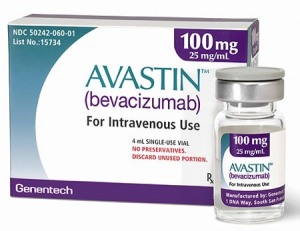. By Jane Mundy
 According to Russell, who stopped taking Avastin after his oncologist determined the cancer drug caused kidney damage, the risks outweigh the benefits.
According to Russell, who stopped taking Avastin after his oncologist determined the cancer drug caused kidney damage, the risks outweigh the benefits.
Russell underwent a second craniotomy one year ago (he was diagnosed with brain cancer in 2008) and he took Avastin for 11 months—long enough to cause kidney damage. “I won’t know the extent of the kidney damage until I have another MRI, but I am concerned,” says Russell. “Avastin is a stand-alone, tumor starvation therapy. It is a double-edged sword.
“I stopped taking Avastin last December because there was protein in my urine, which means that I’m not getting enough protein from the foods I eat and also a sign of kidney damage,” Russell explains. “My doctor took me off Avastin, hoping the damage would reverse itself, but so far it hasn’t, so it would appear that I do have permanent kidney damage. When I pee, my urine forms all kinds of bubbles—I call it my ‘afro-comment.’ It’s like a reminder that these problems can wear on you if you let them…”
But Russell, who will be 50 in March, is doing his best not to let Avastin side effects wear him down, and he has clearly kept his sense of humor. “I’m a very positive person and feel fortunate that I am still here,” he says. “I didn’t have any problems before taking Avastin; I was in perfect shape—I used to run marathons.
“Now my doctor is sending me to a kidney specialist, who is having my blood and urine checked weekly, and has scheduled me for another ultrasound. After my oncologist told me about Avastin and the link to kidney damage I did some research online; it didn’t surprise me that there are now so many Avastin lawsuits.”
A study published in the Journal of the American Society of Nephrology (June 2010) has shown that Avastin is linked to kidney damage. According to the researchers, “a little more than 2 percent of people taking Avastin developed severe proteinuria. Their risk for the condition was found to be almost five times higher than for patients receiving only chemotherapy.” Although the researchers found that patients with kidney cancer were at the highest risk of developing this condition, those who took higher doses of Avastin were at higher risk as well.
Even with the findings from this study, however, doctors stress that it doesn’t mean patients and their providers should stop using it. “The benefits of Avastin are tremendously important for patients who have the types of malignancies that may be responsive to this medication,” said Dr. Bryan Becker, president of the National Kidney Foundation, and some doctors said the incidence of proteinuria with the treatment is not a cause for alarm.
However, a number of researchers and other medical experts said that the results of the study indicate the importance of keeping a close eye on kidney function. “Patients should have baseline determination of kidney status and proteinuria and microalbuminuria [the presence of small amounts of protein in the urine] before starting therapy,” said Dr. Frederick Kaskel, professor and vice chairman of pediatrics at Children’s Hospital at Montefiore Medical Center in New York. And patients need to talk to their physician about having their urine checked before every Avastin treatment. Further, proteinuria places a person at higher risk for blood clots and other complications on top of the risks related to cancer and chemotherapy.
Russell has weighed the odds; he believes that Avastin risks outweigh the benefits and has decided to stop taking the anti-cancer drug. And he is discussing legal options with an Avastin attorney.
